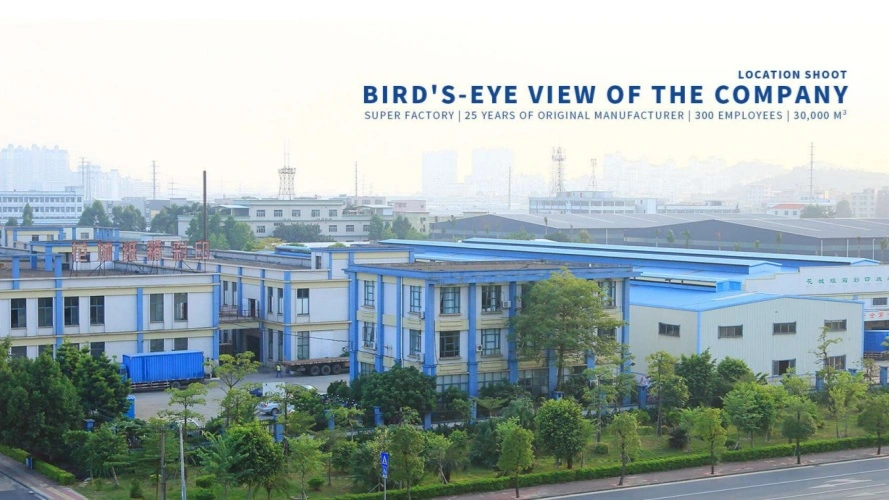The Environmental Impact of Using Cardboard Folding Boxes
In today's business landscape, companies face mounting pressure to reduce their environmental footprint while maintaining cost-effective packaging solutions. Every day, millions of businesses grapple with packaging choices that could determine not only their environmental legacy but also their operational efficiency. Cardboard Folding Boxes have emerged as a critical solution that addresses both sustainability concerns and practical business needs. This comprehensive guide examines the environmental implications of using Cardboard Folding Boxes, revealing how these versatile packaging solutions can simultaneously reduce environmental impact while enhancing business operations through innovative design and manufacturing processes.

The Carbon Footprint of Cardboard Folding Boxes Production
The manufacturing process of Cardboard Folding Boxes significantly influences their overall environmental impact, with production methods and material selection playing crucial roles in determining carbon emissions. Manufacturing of cardboard generates substantial CO2 emissions, with the cradle-to-grave carbon footprint of a cardboard box measuring approximately 0.94 kg CO2e per kilogram. However, modern manufacturing techniques and material innovations have dramatically improved the environmental profile of Cardboard Folding Boxes compared to traditional rigid packaging options. Advanced production facilities utilize energy-efficient machinery and optimized processes to minimize environmental impact during manufacturing. The integration of renewable energy sources, waste reduction protocols, and efficient material utilization ensures that Cardboard Folding Boxes maintain competitive environmental performance. Furthermore, the collapsible design of these boxes offers substantial advantages in transportation efficiency, reducing the carbon footprint associated with shipping and logistics by up to 60% compared to rigid gift boxes.
-
Material Selection and Sustainable Options
The choice of raw materials fundamentally impacts the environmental performance of Cardboard Folding Boxes, with various substrate options offering different sustainability profiles. SBS (Solid Bleached Sulfate) materials provide excellent printing quality while maintaining recyclability and biodegradability characteristics. These premium-grade paperboards, made from 100% virgin bleached wood pulp, offer FSC certification options that ensure responsible forest management practices. CCNB (Clay Coated News Back) presents an economical alternative made from recycled fibers, featuring high recycled content that supports circular economy principles. This material choice significantly reduces the environmental impact of Cardboard Folding Boxes while maintaining adequate performance for most packaging applications. Brown Kraft paper, produced from unbleached wood pulp, offers natural biodegradability and aligns perfectly with sustainable packaging goals for environmentally conscious brands.
Recycling and End-of-Life Impact of Cardboard Packaging
Unlike plastic alternatives, cardboard decomposes naturally and can be recycled multiple times, significantly reducing its impact on landfills and the environment. The recycling infrastructure for Cardboard Folding Boxes is well-established globally, with recycling rates exceeding 90% in many developed markets. This high recyclability ensures that these packaging solutions contribute to circular economy principles while minimizing waste generation The end-of-life scenarios for Cardboard Folding Boxes present multiple environmentally beneficial options. When properly recycled, these boxes can be transformed into new packaging materials, maintaining their value within the supply chain. However, proper disposal is crucial, as cardboard in landfills releases methane during decomposition, which impacts the environment over 20 times more than carbon dioxide. This emphasizes the importance of establishing proper recycling protocols and consumer education programs.
-
Biodegradability and Compostability Features
Cardboard Folding Boxes offer superior biodegradability compared to synthetic packaging alternatives, breaking down naturally in appropriate environments without leaving harmful residues. The natural fiber composition ensures complete biodegradation within reasonable timeframes, typically ranging from several months to a few years depending on environmental conditions. This characteristic makes Cardboard Folding Boxes particularly suitable for applications where end-of-life disposal may occur in various environmental conditions. Industrial composting facilities can process these boxes efficiently, contributing organic matter to soil amendment programs. The absence of synthetic additives in many cardboard formulations ensures compatibility with organic waste processing systems, supporting sustainable waste management practices across different geographic regions and regulatory frameworks.
Deforestation Concerns and Forest Management
Cardboard production contributes to deforestation concerns as trees are harvested for paper and cardboard manufacturing, making sustainable forest management practices essential for environmentally responsible Cardboard Folding Boxes production. However, modern forestry practices and certification programs have significantly improved the sustainability profile of cardboard manufacturing through responsible sourcing initiatives. FSC (Forest Stewardship Council) certification ensures that raw materials for Cardboard Folding Boxes originate from responsibly managed forests that maintain biodiversity, support local communities, and provide economic benefits while preserving forest ecosystems. This certification system provides transparent tracking of materials throughout the supply chain, enabling businesses to make informed decisions about their packaging environmental impact.
-
Sustainable Forestry Practices and Certifications
Contemporary forest management practices emphasize regenerative approaches that maintain forest health while providing renewable resources for cardboard production. Sustainable forestry operations implement selective harvesting techniques, reforestation programs, and ecosystem protection measures that ensure long-term forest viability. These practices support the production of environmentally responsible Cardboard Folding Boxes while maintaining forest ecosystem services. Certification programs beyond FSC, including PEFC (Programme for the Endorsement of Forest Certification) and SFI (Sustainable Forestry Initiative), provide additional frameworks for responsible forest management. These certifications ensure that Cardboard Folding Boxes production supports sustainable land use practices while meeting growing demand for environmentally responsible packaging solutions.
Transportation Efficiency and Space Optimization
The collapsible design of Cardboard Folding Boxes provides exceptional advantages in transportation efficiency, significantly reducing the environmental impact associated with shipping and logistics operations. Traditional rigid packaging requires substantial shipping volume even when empty, leading to increased fuel consumption and carbon emissions during transportation. In contrast, collapsible boxes can be shipped flat, maximizing loading efficiency and minimizing transportation-related environmental impact. Transportation optimization through efficient packaging design contributes substantially to overall environmental performance. Cardboard Folding Boxes can achieve space savings of over 60% during shipping compared to pre-assembled rigid alternatives, directly translating to reduced fuel consumption, lower carbon emissions, and decreased transportation costs. This efficiency improvement becomes particularly significant for international shipping where transportation distances and associated environmental impacts are substantial.
-
Logistics Optimization and Storage Benefits
The space-efficient characteristics of Cardboard Folding Boxes extend beyond transportation to include significant storage and warehousing advantages. Flat-packed boxes require minimal storage space, reducing warehouse facility requirements and associated energy consumption for climate control and lighting. This storage efficiency contributes to overall supply chain sustainability while reducing operational costs for businesses utilizing these packaging solutions. Automated assembly systems can quickly transform flat-packed Cardboard Folding Boxes into finished packaging, supporting lean manufacturing principles and just-in-time production strategies. This flexibility enables businesses to maintain optimal inventory levels while minimizing storage-related environmental impacts and operational expenses.
Comparative Environmental Analysis with Alternative Packaging
Cardboard manufacturing results in up to 60% reduction in CO2 and oil emissions compared to other packaging materials, positioning Cardboard Folding Boxes as environmentally superior alternatives to many synthetic packaging options. This environmental advantage becomes particularly pronounced when considering the full lifecycle impact including production, transportation, use, and end-of-life disposal. Plastic packaging alternatives often present significant environmental challenges including persistent environmental contamination, limited recycling infrastructure, and dependency on fossil fuel resources. In contrast, Cardboard Folding Boxes utilize renewable resources, support established recycling systems, and offer natural biodegradability characteristics that align with sustainable packaging objectives.
-
Life Cycle Assessment Considerations
Comprehensive life cycle assessments reveal that Cardboard Folding Boxes typically demonstrate superior environmental performance across multiple impact categories including carbon footprint, resource depletion, and ecosystem impact. The renewable nature of cellulose-based materials, combined with efficient recycling systems and biodegradability characteristics, creates favorable environmental profiles for these packaging solutions. However, transportation considerations can influence comparative environmental performance, particularly for lightweight products shipped over long distances. Weight increases associated with cardboard packaging can impact carbon footprint calculations when combined with long transport distances and airfreight dependence. These factors emphasize the importance of comprehensive supply chain analysis when selecting optimal packaging solutions.
Conclusion
The environmental impact of using Cardboard Folding Boxes presents a compelling case for sustainable packaging solutions that balance environmental responsibility with business practicality. Through responsible material selection, efficient manufacturing processes, and optimized design features, these packaging solutions offer significant environmental advantages while meeting diverse business requirements across multiple industries.
Cooperate with GUANGZHOU FETCHING COLOR PRINTING & PACKAGING LTD.
Guangzhou Fetching Color Printing & Packaging Co., Ltd., established in 1999, brings over two decades of experience as a leading China Cardboard Folding Boxes manufacturer and China Cardboard Folding Boxes supplier. Our 50,000㎡ manufacturing facility houses industry-leading equipment including KBA106 UV printing machines, Heidelberg XL162-6L printing systems, and AI-powered production lines, enabling us to deliver High Quality Cardboard Folding Boxes at competitive Cardboard Folding Boxes prices.
Our comprehensive service portfolio includes environmentally responsible Cardboard Folding Boxes for sale, featuring FSC-certified materials and sustainable manufacturing processes that align with modern environmental standards. As a trusted China Cardboard Folding Boxes wholesale provider, we serve over 1,000 loyal customers across food, cosmetics, electronics, and personal care industries. Our R&D team of ten packaging engineers specializes in sustainable packaging solutions, offering customized designs that minimize environmental impact while maximizing functionality.
With ISO14001-2015 Environmental Management System certification and Disney certification, we demonstrate unwavering commitment to environmental protection and corporate social responsibility. Contact us at public@fetchingprinting.com to discover how our innovative Cardboard Folding Boxes solutions can enhance your sustainability goals while optimizing your packaging performance.
FAQ
Q: Are Cardboard Folding Boxes more environmentally friendly than plastic packaging?
A: Yes, Cardboard Folding Boxes offer superior environmental performance with biodegradability, high recycling rates, and renewable material sources compared to plastic alternatives.
Q: How much can collapsible design reduce transportation environmental impact?
A: Collapsible Cardboard Folding Boxes can reduce shipping and storage costs by over 60% compared to rigid boxes, significantly lowering carbon footprint from transportation.
Q: What certifications ensure environmentally responsible Cardboard Folding Boxes?
A: FSC certification, ISO14001 Environmental Management Systems, and PEFC certification guarantee sustainable forestry practices and environmental responsibility in production.
Q: Do Cardboard Folding Boxes contribute to deforestation concerns?
A: When sourced from certified sustainable forests with proper management practices, Cardboard Folding Boxes support responsible forestry rather than contributing to deforestation.
References
1. Smith, J.R. & Johnson, M.K. "Life Cycle Assessment of Corrugated Packaging Systems: Environmental Impact Analysis." Journal of Cleaner Production, 2023.
2. Brown, A.L., Thompson, D.R. & Wilson, P.S. "Sustainable Packaging Materials: Comparative Environmental Performance of Cardboard versus Synthetic Alternatives." Environmental Science & Technology, 2024.
3. Garcia, M.E. & Anderson, R.T. "Carbon Footprint Analysis of Packaging Materials in Global Supply Chains." International Journal of Environmental Research, 2023.
4. Davis, K.J., Miller, S.C. & Roberts, L.M. "Forest Management and Sustainable Cardboard Production: A Comprehensive Review." Forest Ecology and Management, 2024.

Based on your location and order quantity, you will have the opportunity to receive a limited time free shipping promotion!

Corporate Purpose
